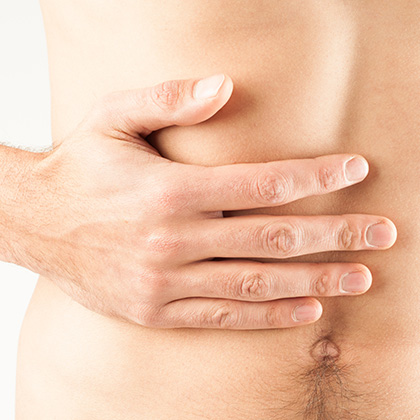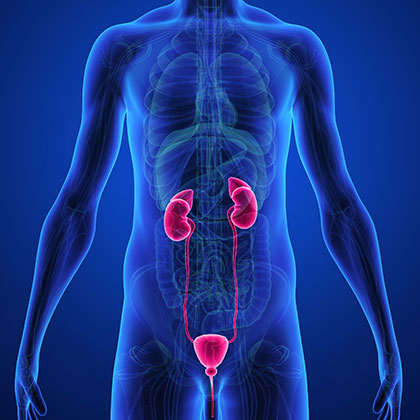
Pancreatitis is inflammation of the pancreas, a small organ found behind the stomach in the upper left abdomen. There are two types of pancreatitis: acute and chronic, both of which can be very painful. If you have acute pancreatitis you may experience an attack that lasts just a few days. But chronic pancreatitis causes repeated and ongoing attacks, and is the result of the pancreas having become permanently damaged from inflammation.
What is the pancreas?
The pancreas has two main functions: it helps with digestion and it produces hormones that regulate our blood sugar levels. Sponge-like in texture it’s about 6 - 10in long and is surrounded by the small intestine, liver and spleen.
Most of the pancreas consists of tissue that produces enzymes that help with digestion. These enzymes – including trypsin and chymotrypsin, which digest proteins; amylase, which digests carbohydrates; and lipase, which breaks down fats – are released into partially digested food in the first segment of the small intestine (duodenum).
The rest of the pancreas is made up of cells called islets of Langerhans, which produce blood sugar-regulating hormones. These hormones include insulin, which helps to lower blood sugar; and glucagon, which raises blood sugar.
Besides pancreatitis, disorders that can affect the pancreas include pancreatic cancer. According to the NHS if you have chronic pancreatitis it can increase your risk of pancreatic cancer – though the chance is still small (i).
Acute pancreatitis
Between 13 - 45 in every 100,000 people have acute pancreatitis each year in the UK (ii), though the number of cases is thought to be rising (iii). And while it can affect people of any age, it’s more common in middle-aged and elderly people (iv).
Acute pancreatitis is a short but sharp illness that usually gets better within a week. The most common symptoms include a sudden, severe pain in the middle of your abdomen, nausea, sickness and diarrhoea. Thankfully most people recover without any further problems, but some cases can be severe and even life-threatening.
What causes acute pancreatitis to flare up?
More than eight out of 10 cases of acute pancreatitis are caused either by gallstones – the most common cause – or drinking alcohol. Women are thought to be more likely to develop acute pancreatitis as a result of having gallstones, while men are more likely to develop alcohol-related pancreatitis (iv).
If you have gallstones, one of the stones can get stuck in the duct where enzymes from the pancreas are released into the duodenum, blocking the duct and triggering the symptoms of pancreatitis.
Meanwhile around a third of cases of acute pancreatitis are associated with drinking alcohol, though experts still aren’t clear why this is the case (ii). In fact, some believe that alcohol itself doesn’t damage the pancreas, but it may make the pancreas more sensitive to damage from other things such as smoking and high levels of fat in the blood. Called hypdertriglyceridaemia, high levels of fat in the blood is thought to cause up to four per cent of all cases of acute pancreatitis (ii)).
There are also other, less common causes of acute pancreatitis, such as some viruses, injury or surgery around the pancreas, parasite infections, certain autoimmune diseases including Sjogren’s syndrome and having high blood calcium levels. Some people can also inherit a rare form of pancreatitis from one of their parents. Meanwhile in around one in 10 cases the cause of acute pancreatitis is unknown (ii).
You could have just one single attack of acute pancreatitis, or the attacks may keep coming back. If you keep getting attacks your pancreas may become permanently damaged, causing chronic pancreatitis.
Chronic pancreatitis
We don’t know exactly how many people in the UK have chronic pancreatitis, but doctors estimate around three in every 100,000 people could be affected (v). And while chronic pancreatitis can affect people of any age, it’s more common in men and usually starts to develop between the ages of 30 and 40, with the average age of those affected being 51 (vi). Most people who have chronic pancreatitis have had at least one attack of acute pancreatitis (vi). And, like acute pancreatitis, cases of chronic pancreatitis are rising.
The most common symptom of chronic pancreatitis is severe burning or shooting pain in your abdomen that often starts in the middle of left side, moving along your back. The pain comes and goes but can last for hours or even days. There’s often no trigger for it, but some say it starts after they’ve eaten.
The longer you have chronic pancreatitis, the more frequently you may have this pain, which can become increasingly severe. Eventually you may have a constant dull pain, interspersed with attacks of severe pain. This constant pain can be difficult to treat, and can have a serious effect on your quality of life, potentially causing stress, anxiety and depression.
Other symptoms you may experience if you’ve had chronic pancreatitis for several years include weight loss, jaundice (yellowing of the skin and eyes), nausea and vomiting, as well as some of the symptoms of diabetes including tiredness, thirst and needing to urinate frequently.
If you have chronic pancreatitis, you could go on to actually develop diabetes if your pancreas has become damaged and is unable to produce insulin. According to the NHS diabetes affects about a third of people with chronic pancreatitis (vii).
What are the causes of chronic pancreatitis?
Alcohol is by far the most common cause of chronic pancreatitis, affecting around seven in every 10 cases (mostly men). According to Patient, in most cases those affected have been drinking heavily for at least 10 years before their symptoms began (viii). However gallstones, which are one of the most common causes of acute pancreatitis, don’t usually cause chronic pancreatitis (though they can in cases where a bile duct – the tube that attaches the gallbladder to the liver – becomes damaged by a gallstone or by infection).
Other, less common causes include:
-
Smoking
-
Autoimmunity (this is when your immune system attacks your pancreas, which can be linked with other autoimmune conditions such as Sjogren’s syndrome)
-
Genetics (some people inherit a gene that stops their pancreas working properly)
-
Injury to the pancreas
-
Radiotherapy to the abdomen
However around two out of 10 cases of chronic pancreatitis have no known cause (viii).
Treatments for pancreatitis
Most people with acute pancreatitis have to be admitted to hospital where they can get treatments that support their body until the inflammation in their pancreas has subsided. These often include intravenous fluids (fluids via a drip), strong pain relief, oxygen and nutritional support in the form of feeding via a nasogastric tube. If you have a severe attack, you may have to be monitored closely in an intensive care unit, or you may even need surgery to remove any infected or damaged tissue in your pancreas (about one in five cases develops severe acute pancreatitis (ii)).
Depending on the cause of the attack, you may need treatment such as medication to treat high blood fat levels, antibiotics if you have an infection, gallbladder surgery or you may have to stop drinking alcohol completely.
Chronic pancreatitis treatments
There is no way to reverse the damage to the pancreas in chronic pancreatitis, but there are ways of controlling the condition and managing the symptoms. Lifestyle changes are often recommended, such as stopping drinking alcohol (even if alcohol isn’t the cause you are usually advised to stop drinking altogether) and giving up smoking. Indeed, those who don’t smoke and avoid drinking alcohol after being diagnosed with chronic pancreatitis tend to experience less pain and live longer than others who keep drinking and smoking (vii).
You may also have to change your diet, since chronic pancreatitis can affect your ability to digest certain foods (according to the NHS your specialist should refer you to a dietitian who can advise you on following a low-fat, high-protein, high-calorie diet (ix)).
Pain relief is also an important part of chronic pancreatitis treatment, and initially you may be advised to take simple painkillers such as paracetamol. If your pain is more severe you may need opiate-based painkillers such as codeine or tramadol – though these can be problematic, as, besides causing certain side effects, they can also cause dependency problems.
Meanwhile if you experience severe pain you may need surgery to help relieve your pain or treat any complications. In very severe cases, the pancreas may be removed entirely.
How can you prevent pancreatitis?
Since acute pancreatitis is most often caused by gallstones or drinking alcohol, making certain lifestyle changes may reduce your chances of developing it.
According to the NHS, the most effective way of preventing gallstones is by eating a balanced diet that includes at least five portions of fruit and vegetables a day (x). Avoiding eating too many fatty foods may also be a good idea, since there seems to be a link between having high cholesterol and developing gallstones. Try to choose lower-fat alternatives when you go food shopping – for instance, go for skimmed or semi-skimmed milk instead of whole milk, and look for low-fat versions of foods such as yoghurt, cheese and salad dressings (but be aware that may processed foods that are low in fat can contain high amounts of sugar).
Also try cooking with less fat – ideally, use a spray oil if you have to use fat for frying (try baking, steaming or grilling instead). Taking the skin off meat and choosing leaner cuts can also help reduce your fat intake.
Losing weight may also help if you’re overweight and especially if you’re obese. That’s because when you carry excess weight you’re more likely to have a higher level of cholesterol in your bile, which can increase your likelihood of developing cholesterol stones in your gallbladder. Losing weight can reduce your risk, but avoid losing weight too quickly, as rapid weight loss may play a part in the development of gallstones. Your GP can advise you about losing weight more slowly and steadily at a rate of around 1-2lb per week.
Staying active may be a good idea too, since exercise not only helps you maintain a healthy weight but it may also help prevent the formation of gallstones by improving bile flow (bile is a substance made in your liver that helps break down your food). Aim for 30 minutes of moderate-intensity activity – where you feel warm and slightly out of breath – five times a week (or 150 minutes a week).
Meanwhile research suggests that smoking may increase the risk of gallstones (xi), so if you’re a smoker it may be a good idea to consider giving up. If you need help with quitting, there are products available that can reduce your nicotine cravings, such as patches, lozenges and gum. Read our tips on how to stop smoking here.
Pancreatitis and alcohol
Reducing the amount of alcohol you drink can also reduce your risk of developing acute pancreatitis and helps to prevent your pancreas becoming damaged.
UK guidelines suggest the following:
-
Drink no more than 14 units of alcohol every week
-
Try to spread your drinking over three days or more if you drink the maximum recommended (ie 14 units a week)
A unit of alcohol contains 10ml or 8g of pure alcohol, so how many units each drink contains depends on its strength (measured as the percentage of alcohol by volume, or ABV). In general, a unit is the equivalent of slightly less than half a pint of standard-strength beer or lager (4% ABV), a single shot (25ml) of spirits (40% ABV) or slightly less than half a 175ml glass of wine (13% ABV).
For tips on things you can do that may help you cut down on how much alcohol you drink, read our alcohol misuse guide. There’s also more information on alcohol units on the Drinkaware website.
Pancreatitis is a serious medical condition that needs to be treated by health professionals. But having a healthy lifestyle can help reduce your chances of developing acute pancreatitis. Find out more about a wide range of health issues by taking a look around the rest of our pharmacy health library.
References:
-
Available online: https://www.nhs.uk/conditions/chronic-pancreatitis/
-
Available online: https://patient.info/digestive-health/gallstones-and-bile/acute-pancreatitis
-
Available online: https://patient.info/doctor/acute-pancreatitis-pro
-
Available online: https://www.nhsinform.scot/illnesses-and-conditions/stomach-liver-and-gastrointestinal-tract/acute-pancreatitis
-
Available online: https://patient.info/doctor/chronic-pancreatitis-pro
-
Available online: https://www.nhs.uk/conditions/chronic-pancreatitis/
-
Available online: https://www.nhsinform.scot/illnesses-and-conditions/stomach-liver-and-gastrointestinal-tract/chronic-pancreatitis
-
Available online: https://patient.info/digestive-health/chronic-pancreatitis-leaflet
-
Available online: https://www.nhs.uk/conditions/chronic-pancreatitis/treatment/
-
Available online: https://www.nhs.uk/conditions/acute-pancreatitis/prevention/
-
Available online: https://www.hopkinsmedicine.org/health/conditions-and-diseases/smoking-and-the-digestive-system
You Might Also Like
Disclaimer: The information presented by Nature's Best is for informational purposes only. It is based on scientific studies (human, animal, or in vitro), clinical experience, or traditional usage as cited in each article. The results reported may not necessarily occur in all individuals. Self-treatment is not recommended for life-threatening conditions that require medical treatment under a doctor's care. For many of the conditions discussed, treatment with prescription or over the counter medication is also available. Consult your doctor, practitioner, and/or pharmacist for any health problem and before using any supplements or before making any changes in prescribed medications.

Christine
Christine Morgan has been a freelance health and wellbeing journalist for almost 20 years, having written for numerous publications including the Daily Mirror, S Magazine, Top Sante, Healthy, Woman & Home, Zest, Allergy, Healthy Times and Pregnancy & Birth; she has also edited several titles such as Women’ Health, Shine’s Real Health & Beauty and All About Health.
View More



